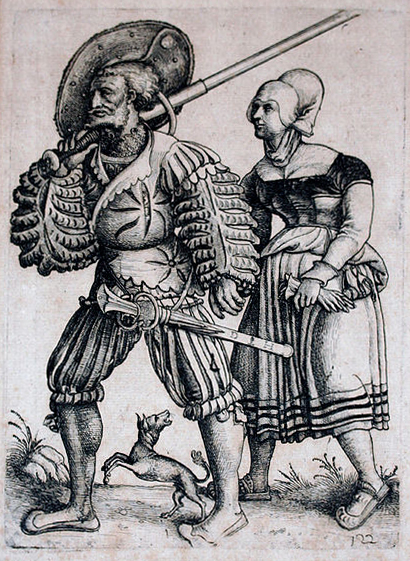Tross on:
[Wikipedia]
[Google]
[Amazon]

 The was the
The was the

 The was the
The was the camp follower
Camp followers are civilians who follow armies. There are two common types of camp followers; first, the wives and children of soldiers, who follow their spouse or parent's army from place to place; the second type of camp followers have histori ...
contingent of the Landsknecht
The (singular: , ), also rendered as Landsknechts or Lansquenets, were Germanic mercenaries used in pike and shot formations during the early modern period. Consisting predominantly of pikemen and supporting foot soldiers, their front line wa ...
mercenary regiments which originated at the end of the fifteenth century, and were the dominant form of infantry mercenary force throughout the sixteenth century. Each unit traveled with a contingent, which followed behind. They carried the military and fighting necessities, the food and the belongings of each "Soldat" ("soldier") and his family. Members of the were made up of women, children, craftsmen and day laborers. The term "support staff" can be used to give the German word a clearer meaning, although its true English translation is "unit train" or "baggage train
''Wagon Train'' is an American Western series that aired 8 seasons: first on the NBC television network (1957–1962), and then on ABC (1962–1965). ''Wagon Train'' debuted on September 18, 1957, and became number one in the Nielsen ratings. It ...
". Sometimes spelled ''Dross'', the term derives from Middle High German
Middle High German (MHG; german: Mittelhochdeutsch (Mhd.)) is the term for the form of German spoken in the High Middle Ages. It is conventionally dated between 1050 and 1350, developing from Old High German and into Early New High German. High ...
''trosse'', from French ''trousse'' ("kit"); it is not related to English ''dross'' (Old English ''drōsna, drōsne'', "dregs, sediment").
Many women of the were wives of the soldiers, or other family members such as sisters, nieces, or daughters. Some of the women were betrothed to a member of the military unit. Very few single, unattached women were permitted into the ranks of the in fear that their possible turn to prostitution would cause unrest in the baggage train by disrupting family relationships. Unattached women allowed into the were those who possessed a skill or trade which made them a valuable asset, not only to the unit, but to the military unit as well. However, they were closely watched until they took a legitimate husband.
The custom of a regiment being followed by the continued beyond the period of the . During the Thirty Years' War
The Thirty Years' War was one of the longest and most destructive conflicts in European history
The history of Europe is traditionally divided into four time periods: prehistoric Europe (prior to about 800 BC), classical antiquity (80 ...
, it could occur that a 1,000-man regiment would be accompanied by 500 women and 300 children. The was indispensable for supply purposes, although it limited the freedom of movement of the army. At times, the fell prey to opposing armies.
Notes
''Portions of this article were translated from the German Wikipedia.''References
* Möller, Hans-Michael. ''Das Regiment der Landsknechte: Untersuchungen zu Verfassung, Recht und Selbstverständnis in Deutschen Söldnerheeren des 16. Jahrhunderts''. Frankfurter Historische Abhandlungen (Steiner), 1976. Landsknechts German words and phrases {{Germany-mil-stub